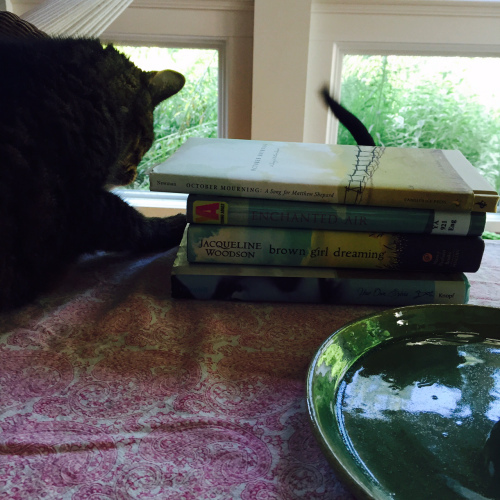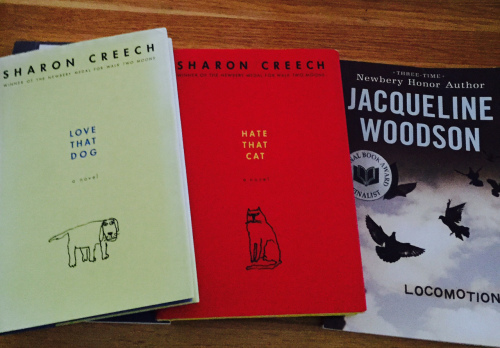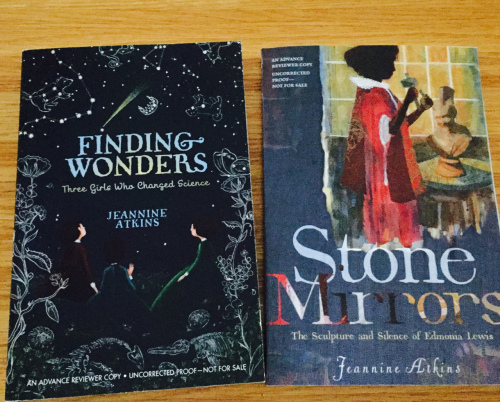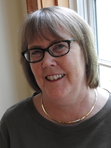Who is a Poet? Who Gets to Decide?
At the beginning of the class I taught on verse novels, a student told us she’d asked a prominent writer whether she might write a good one if she isn’t an experienced poet. He told her no. This story sort of hovered over us through the course. Even if no one had told us we shouldn’t attempt what we were attempting, our own minds supplied such a voice. We began reading Jacqueline Woodson’s Locomotion and Sharon Creech’s Love That Dog, in which both Lonnie and Jack have teachers who see poets in their sensitive young students. But we also read essays from writers who insisted that not every child is or can be a poet. We’re grownups, but we have histories of encouragement and dismissals. Who is a poet and who gets to decide?

Through July, we read verse novels and composed parts of some, trying to blend poetry and stories. As we wrote, we didn’t murmur aloud, “Is this worthy of being called verse? Is it good enough?” But I could feel the breath of the effort to infuse narrative with lyric moments. And everyone wrote some brilliant pieces. We had much to celebrate in the last class as people read work aloud. It was a festive evening.
Then the next day I got an email from a student, who let me know that she wasn’t going to stalk me with her doubt, but what she’d read the night before sounded a little flat to her ears, maybe partly in comparison to other more brilliant work.
Her work wasn’t flat. But I understand that amidst the celebration, traces of doubt were rising. Second thoughts had appeared in apologies we quickly squashed.
Doubt is always with us, and I think can rear high right after a class. We’ve had deadlines, prompts, structure, and each other’s interest and applause, and now all that is gone. I told my student a bit of what I loved in her work and advised her to reread Anne Lamott’s Bird by Bird and read Art and Fear. She wrote back that she would and was going for a swim. A lake was another most excellent idea.
A writing class makes a sort of home, and it’s sad when that door closes. But there will be other homes, though we have to make them. Staying connected with people in the class, and/or finding others who will share work, deadlines, and cheers. Doubt is part of the process. It doesn’t mean one should stop work. Rather we should make a place where it can be swatted down and kept in its proper sleepy place.

In Hate That Cat, Jack gets another school year with Ms. Stretchberry, who encourages him to examine his antipathy to cats, move beyond grief, write about a new love, and experiment with more poetic forms. Locomotion has shown Lonnie mourning not a dog, but his parents. And in Jacqueline Woodson’s follow-up, Peace, Locomotion, Ms. Marcus, who called him a poet – “Not a whole lot of people be saying, ‘Good, Lonnie,’ to me.” — is gone, replaced by a teacher who says he’s not a poet as he isn’t published. He stops writing poems, and more of the book is made up of letters to his sister. Though the poetry shines through.
Not just in a class but in our whole lives as writers, we’ll meet those who nudge us forward and those who seem to hold us back. Sometimes they can be the same person. Sometimes they can be us. Perhaps the writer who was asked by my student if she might be up to this challenge thought that if she had to ask, she didn’t have the talent or fortitude. But he was wrong. A better answer might have been to say, “I don’t know. What do you think?”
None of us can see the future value of anyone’s work, including our own. When I’m asked about potential, I like to err on the side of “go for it.” Writers owe that to each other as much as we need to urge each other to go back for another draft, letting each revision teach us how to make the next better. Most of us who write remember both teachers who saw hope in our work and ones who were unmoved. Both nurturing and fearful voices remain in our heads. Our job becomes to feel prodded by both, raising our own standards, while being kind to ourselves.

Meanwhile, we try to be grateful for the process, as no one knows how what we write will be received. Finding Wonders will be published this September. Stone Mirrors will come out this coming January. I love having two books of historical verse, which represent perhaps ten years of work, moving into the world together. Sometimes we get such happy endings – before we begin again.
Please visit the ever-encouraging Tara at A Teaching Life to enjoy more Poetry Friday posts.





